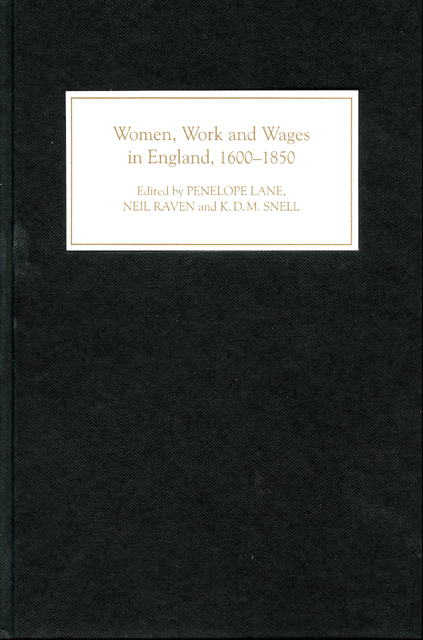Book contents
- Frontmatter
- Contents
- Illustrations
- Notes on Contributors
- Acknowledgements
- Introduction
- 1 ‘Waste’ Children? Pauper Apprenticeship Under the Elizabethan Poor Laws, c. 1598–1697
- 2 Gender at Sea: Women and the East India Company in Seventeenth-Century London
- 3 Sickles and Scythes Revisited: Harvest Work, Wages and Symbolic Meanings
- 4 A Customary or Market Wage? Women and Work in the East Midlands, c. 1700–1840
- 5 ‘Meer Pennies for My Baskitt Will be Enough’: Women, Work and Welfare, 1770–1830
- 6 Caring for the Sick Poor: Poor Law Nurses in Bedfordshire, c. 1770–1834
- 7 ‘A ‘Humbler, Industrious Class of Female’: Women’s Employment and Industry in the Small Towns of Southern England, c. 1790–1840
- 8 A Diminishing Force? Reassessing the Employment of Female Day Labourers in English Agriculture, c. 1790–1850
- Bibliography
- Index
7 - ‘A ‘Humbler, Industrious Class of Female’: Women’s Employment and Industry in the Small Towns of Southern England, c. 1790–1840
Published online by Cambridge University Press: 21 March 2023
- Frontmatter
- Contents
- Illustrations
- Notes on Contributors
- Acknowledgements
- Introduction
- 1 ‘Waste’ Children? Pauper Apprenticeship Under the Elizabethan Poor Laws, c. 1598–1697
- 2 Gender at Sea: Women and the East India Company in Seventeenth-Century London
- 3 Sickles and Scythes Revisited: Harvest Work, Wages and Symbolic Meanings
- 4 A Customary or Market Wage? Women and Work in the East Midlands, c. 1700–1840
- 5 ‘Meer Pennies for My Baskitt Will be Enough’: Women, Work and Welfare, 1770–1830
- 6 Caring for the Sick Poor: Poor Law Nurses in Bedfordshire, c. 1770–1834
- 7 ‘A ‘Humbler, Industrious Class of Female’: Women’s Employment and Industry in the Small Towns of Southern England, c. 1790–1840
- 8 A Diminishing Force? Reassessing the Employment of Female Day Labourers in English Agriculture, c. 1790–1850
- Bibliography
- Index
Summary
A survey of recent research confirms that comparatively few studies have been undertaken into the urban economies of southern England’s towns during the Industrial Revolution. Indeed, it is now widely assumed that by the late eighteenth century this region consisted of little more than slow-growing market towns. Some of these towns had once possessed manufactories, as the observations of early eighteenth-century commentators such as Daniel Defoe testify. However, their association with industry is generally considered to have come to an end by the start of the Industrial Revolution. By this time, according to Clark, their old industrial specialities were ‘draining away’. Various explanations have been advanced to account for this decay. According to Jones, the decline of southern manufactories was the consequence of forces of comparative advantage. The topography, labour supply conditions, lighter soils and milder climate of the region made agriculture a more attractive commercial proposition than manufacture. As a result of these changing terms of trade, labour and capital shifted out of industry and into land. Meanwhile, Clark has emphasised the role played by London. The capital’s high prices and labour costs spread into the surrounding counties and encouraged industry to migrate to cheaper areas.
Yet, to earlier generations of historians the depiction of late eighteenth and early nineteenth century southern England as a region devoid of industry would have seemed rather incredulous. Warner’s study, published in 1921, describes how the silk industry had become firmly established across much of southern England by the early 1800s. Meanwhile, Edwards has shown that, far from being in rapid decline after 1818, Norwich’s ancient textile industry remained a large employer and one able to enjoy periods of prosperity into the 1860s. Similarly, Coleman’s work on the Courtaulds offers a detailed insight into a highly successful southern manufacturing enterprise whose origins date back to the early nineteenth century. However, while important in helping to restore a more balanced impression of southern England’s economy during the industrial age, such studies reveal little about the full extent of urban manufacturing in the region. In addition, no explanation readily emerges from these works of how southern manufactories were able to defy the principles of comparative advantage and transaction–cost theory, as outlined by Jones and Clark respectively.
- Type
- Chapter
- Information
- Women, Work and Wages in England, 1600-1850 , pp. 170 - 189Publisher: Boydell & BrewerPrint publication year: 2004
- 1
- Cited by



